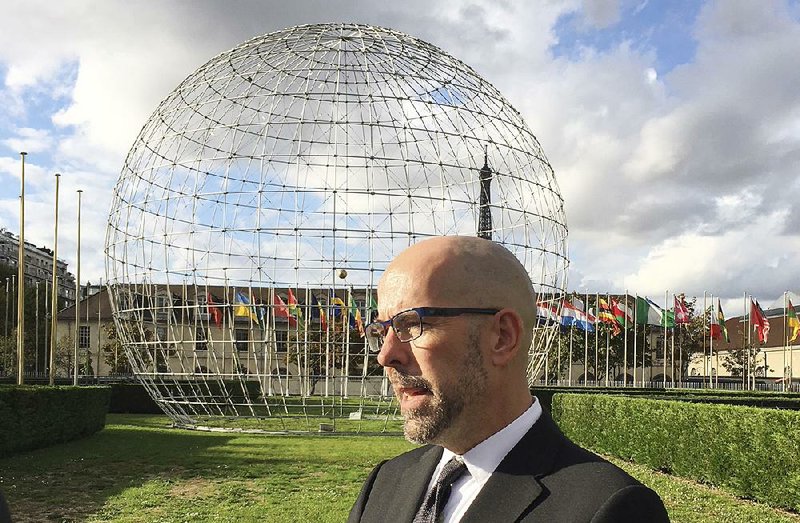PARIS -- The United States announced Thursday that it is pulling out of the U.N.'s educational, scientific and cultural agency in part because of what Washington sees as its anti-Israel bias.
Israeli Prime Minister Benjamin Netanyahu said Israel plans to follow suit.
While President Donald Trump's administration had been preparing for a likely withdrawal from UNESCO for months, the timing of the State Department's statement was unexpected. The Paris-based agency's executive board is in the midst of choosing a new chief -- with Qatar's Hamad bin Abdulaziz al-Kawari leading the heated election heading into today's final vote.
Outgoing Director-General Irina Bokova expressed "profound regret" at the U.S. decision and tried to defend UNESCO's reputation. The organization is best known for its World Heritage program to protect cultural sites and traditions, but also works to improve education for girls, promote understanding of the Holocaust's horrors, and to defend media freedom.
Bokova called the U.S.' planned departure a loss for "the United Nations family" and for multilateralism. The U.S. and UNESCO matter to each other more than ever now with "the rise of violent extremism and terrorism," she said.
The U.S. stopped funding UNESCO after it voted to include Palestinians as full members in 2011, but the State Department has maintained a UNESCO office and sought to weigh in on policy behind the scenes. The U.S., which contributed about 22 percent of UNESCO's budget until 2011, now owes about $550 million in back payments.
In a statement, the State Department said the decision will take effect Dec. 31, 2018, and that the U.S. will seek a "permanent observer" status instead. It cited U.S. belief in "the need for fundamental reform in the organization."
Netanyahu said Thursday that Israel also plans to withdraw from the agency, saying it had become a "theater of the absurd because instead of preserving history, it distorts it."
Israel has been angered by resolutions that diminish its historical connection to the Holy Land by naming ancient Jewish sites as Palestinian heritage sites.
Praising Trump's decision as "brave and moral," Netanyahu said he has ordered Israeli diplomats to prepare for Israel's withdrawal from the organization in concert with the Americans.
Israel's ambassador to the United Nations, Danny Danon, also praised Washington's move as heralding "a new day at the U.N., where there is a price to pay for discrimination against Israel."
"The United States stands by Israel and is a true leader for change at the U.N.," Danon said. "The alliance between our two countries is stronger than ever."
U.S. officials said Secretary of State Rex Tillerson made the decision and it was not discussed with other countries. The officials were not authorized to be publicly named discussing the issue.
Nikki Haley, U.S. ambassador to the United Nations, called UNESCO's July designation of Hebron's Old City and the Tomb of the Patriarchs as Palestinian territory the latest of many "foolish actions" that had made the agency "a chronic embarrassment."
Haley also criticized UNESCO for "keeping Syrian dictator Bashar Assad on a UNESCO human-rights committee even after his murderous crackdown on peaceful protesters."
The United States has pulled out of UNESCO before. President Ronald Reagan's administration did in 1984 because it viewed the agency as mismanaged, corrupt and used to advance Soviet interests. The U.S. rejoined in 2003, saying the agency could help in the fight against terrorism.
The State Department informed Bokova it intends to stay engaged at UNESCO as a nonmember "observer state" on "non-politicized" issues, including the protection of World Heritage sites, advocating for press freedoms and promoting scientific collaboration and education.
"We will be carefully watching how the organization and the new director-general steers the agency," Charge d'Affaires Chris Hegadorn, the ranking U.S. representative to UNESCO, said. "Ideally, it steers it in a way that U.S. interests and UNESCO's mandate will converge."
UNESCO's 58-member executive board plans to select Bokova's successor from among three finalists remaining from the field of seven candidates under consideration at the beginning of the week.
Along with al-Kawari, Qatar's former culture minister, the finalists are Audrey Azoulay, a former culture minister in France, and former Egyptian government minister Moushira Khattab. The board's pick then goes to the full UNESCO general assembly next month for final approval.
Information for this article was contributed by Aron Heller and Angela Charlton of The Associated Press.
A Section on 10/13/2017
